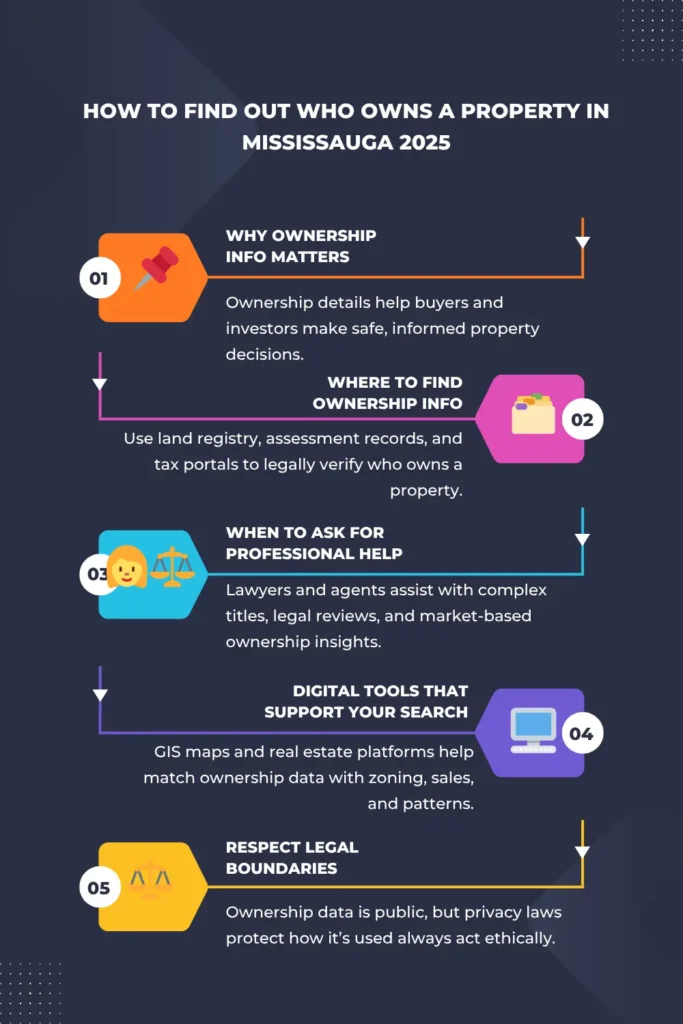How to Find Out Who Owns a Property in Mississauga 2025


Understanding who owns a property in Mississauga 2025 isn’t just a curiosity it’s a smart, strategic move for anyone involved in real estate. Whether you’re a potential buyer, investor, tenant, or researcher, having access to accurate ownership information can guide better decisions in a market that continues to evolve in 2025.
Table of Contents
ToggleThe property in Mississauga 2025 market shows steady recovery, with average home prices stabilizing around the $1 million mark. While detached homes remain popular, condos and townhomes near transit corridors are gaining traction due to affordability and accessibility. In a city where new development and resale activity are both strong, being able to find property in Mississauga 2025 ownership information is more important than ever especially when evaluating purchase options, preparing offers, or verifying investment potential.
Knowing who owns a property in Mississauga 2025 serves several practical purposes:
In Mississauga’s 2025 real estate climate, where market activity has spread beyond the city core, ownership details are a window into larger patterns of movement and investment.
The most accurate method is to access the provincial land registry. By searching a specific property in Mississauga 2025, you can purchase a legal title document showing:
The current registered owner(s)
The legal land description
Any existing liens, mortgages, or encumbrances
The title search usually requires a small fee and can be completed online without visiting a courthouse or city office.
City property records include assessment data and sometimes mailing information tied to ownership. These records can provide clues even if the name of the owner is not explicitly shown by showing:
Owner’s mailing address
Assessed property value
Tax account details
These sources are helpful when validating if the owner is an individual, business, or absentee landlord of a property in Mississauga 2025.
Some municipalities offer access to tax billing info based on a property’s roll number or address. This may reveal the contact address of the registered owner or corporation, which is useful when confirming legal mail routes and non-resident ownership. It’s particularly relevant when trying to validate a property in Mississauga 2025 under corporate or long distance ownership.
While basic searches can be done independently, a legal or professional touch may be needed in more complex cases.
A real estate lawyer can:
Perform detailed title searches
Identify claims against the property in Mississauga 2025
Interpret shared or corporate ownership
Assist in removing title related issues during transactions
Legal assistance is particularly important when a property has multiple owners, is owned by a company, or has liens or easements attached.
Experienced real estate professionals familiar with property in Mississauga 2025 can offer:
Local insights into ownership trends
MLS history and recent sale info
Context about who typically owns in various neighbourhoods
For example, professionals often know which communities are dominated by investors versus owner-occupiers, helping you evaluate who you’re dealing with in the property in Mississauga 2025 market.
Several tools exist that support ownership research, including:
Municipal GIS Maps: These interactive maps allow you to view zoning, property boundaries, and sometimes parcel ID information tied to legal records.
Real Estate Portals: Though they don’t list personal ownership data, they often show recent transactions, property in Mississauga 2025 history, and value trends.
Searchable Ownership Databases: Some systems use public record scraping to track patterns such as absentee ownership, numbered corporations, or high volume investment portfolios.
These tools, while helpful, should always be used to supplement official land title documents when researching a property in Mississauga 2025.
In 2025, Mississauga continues to develop along key transit and urban intensification zones. Understanding ownership in these areas is especially useful:
City Centre & Hurontario: High turnover and pre construction developments make ownership knowledge essential for smart bidding.
Lakefront Areas: Investors are increasingly targeting lakeside redevelopment zones. Identifying absentee or corporate owners can open buying opportunities.
Suburban Communities: In places like Erin Mills, Lisgar, or Churchill Meadows, knowing whether a property in Mississauga 2025 is investor or family owned can inform your strategy as a buyer or developer.
Overall, knowing who owns a property in Mississauga 2025 gives you a strategic edge, especially when identifying underused properties, preparing offers, or scouting for rental investment. The ownership landscape of a property in Mississauga 2025 is a reflection of broader market dynamics and often a precursor to opportunity.
It’s important to know what’s legal and what isn’t:
You can access ownership records as a member of the public through formal channels.
You cannot misuse ownership data to harass, pressure, or spam individuals.
Corporate ownership may be public, but individual owners are protected under privacy laws.
Always use contact details for legitimate purposes like exploring a sale or addressing a dispute. Every property in Mississauga 2025 is subject to these ethical and legal guidelines, and respecting them ensures responsible real estate engagement.
Ownership data is a tool, not a weapon. Respect for privacy and legal ethics must guide all searches.
Start with a land title search using the property’s legal address.
Use municipal assessment records to compare assessed value and mailing address.
Check parcel maps or GIS tools to confirm zoning and land use.
Consider a lawyer or agent for interpretation, especially for complex titles.
Verify information and act respectfully, keeping legal use in mind.
Knowing who owns a property in Mississauga 2025 is not just about checking a box it’s a crucial step in navigating a maturing real estate market. From land title systems to tax records and professional support, there are many legal and effective ways to discover ownership information. If you want to make well informed, strategic decisions, start by understanding the ownership structure of any property in Mississauga 2025 you’re interested in.
Whether you’re planning to buy, invest, rent, or simply research, combining official records with local knowledge and technology will empower you to make smart, ethical, and well informed decisions involving property in Mississauga 2025.